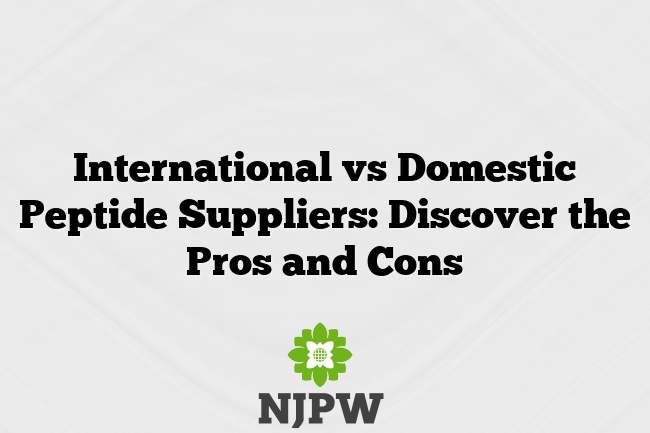Signs You’re Using the Wrong Peptide – Is Your Supplement Doing More Harm Than Good?

Peptides have become a buzzword in the world of health and wellness, promising everything from enhanced muscle growth to improved cognitive function. However, navigating the complex landscape of peptide supplements can be a daunting task, with the potential for more harm than good if the wrong product is chosen. In this comprehensive guide, we’ll explore the signs that you might be using the wrong peptide and provide valuable insights to ensure your supplementation is safe and effective.
What are Peptides?
Peptides are short chains of amino acids that play a crucial role in various biological processes within the human body. They are often referred to as the “building blocks” of proteins and can have a wide range of physiological effects, depending on their specific composition and function. Peptides can be found naturally in foods, but they are also commonly synthesized and used as dietary supplements to target specific health and performance goals.
| Peptide Type | Primary Function | Common Applications |
|---|---|---|
| Growth Hormone-Releasing Peptides (GHRPs) | Stimulate the release of human growth hormone (hGH) | Muscle building, fat loss, anti-aging |
| Thymosin Beta-4 | Promote cell regeneration and wound healing | Skin and hair health, injury recovery |
| Sermorelin | Stimulate the pituitary gland to produce more hGH | Anti-aging, metabolic enhancement |
Identifying the Right Peptide for Your Needs
When it comes to peptide supplementation, it’s crucial to identify the specific peptide that aligns with your health and fitness goals. MK-677, for example, is a popular GHRP that can help increase lean muscle mass and fat loss, while BPC-157 is known for its ability to support tissue repair and wound healing. Carefully researching the intended effects of each peptide and how they interact with your individual physiology is essential to ensure you’re using the right supplement for your needs.
Common Pitfalls of Peptide Supplementation
Despite the potential benefits of peptide supplements, there are several common pitfalls that users may encounter. One of the most significant issues is the use of low-quality or impure peptides, which can lead to adverse side effects and suboptimal results. Additionally, many individuals fail to properly cycle their peptide usage, leading to desensitization or hormonal imbalances. Improper dosing and a lack of personalized guidance from healthcare professionals can also contribute to the ineffectiveness or potential harm of peptide supplementation.
Warning Signs of an Ineffective or Harmful Peptide
Recognizing the warning signs of an ineffective or harmful peptide is crucial to ensure your safety and well-being. Lack of expected results, such as no change in body composition or performance, may indicate that the peptide is not of high quality or is not the right fit for your needs. Adverse side effects, such as headaches, nausea, or hormonal imbalances, are also red flags that the peptide may be causing more harm than good. If you experience any concerning symptoms, it’s essential to discontinue use and consult with a healthcare professional.
Evaluating Purity and Quality
When it comes to peptide supplements, purity and quality are paramount. Reputable brands will provide third-party lab testing results to ensure the product’s potency and purity, free from contaminants or adulterants. It’s also important to look for certificates of analysis and to research the manufacturer’s reputation and track record. Avoiding sketchy online vendors and opting for well-established, transparent companies can help you ensure you’re getting a high-quality, safe peptide supplement.
Potential Side Effects to Watch Out For
While peptide supplements can offer numerous benefits, it’s essential to be aware of the potential side effects. Hormonal imbalances, such as disruptions in testosterone or estrogen levels, can occur with improper dosing or cycling. Gastrointestinal issues, including nausea, vomiting, or diarrhea, may also arise, particularly with certain peptides. In rare cases, cardiovascular complications or neurological effects have been reported. Monitoring your body’s response and consulting with a healthcare professional is crucial to mitigate these risks.
Optimizing Dosage and Cycling
Proper dosage and cycling are critical to achieving the desired results from peptide supplements while minimizing the risk of adverse effects. Underestimating or overestimating the appropriate dosage can lead to ineffectiveness or potential harm. Likewise, failing to cycle peptide usage, taking breaks, and allowing your body to reset can result in desensitization and diminished benefits. Consulting with a healthcare professional who specializes in peptide therapy can help you develop a personalized protocol to optimize your results safely.
Interactions with Medications and Other Supplements
Peptide supplements can potentially interact with certain medications and other supplements, so it’s crucial to disclose your full medical history and current regimen to your healthcare provider. Some common interactions include interference with blood thinners, changes in blood sugar levels for individuals with diabetes, and hormonal imbalances when combined with certain performance-enhancing drugs. Carefully researching potential interactions and working closely with your healthcare team can help you navigate these complexities safely.
Consulting with Experts for Personalized Guidance
Given the complexity and potential risks involved with peptide supplementation, it’s highly recommended to consult with healthcare professionals who specialize in this area. Endocrinologists, sports medicine physicians, and anti-aging specialists can provide personalized guidance on the appropriate peptide, dosage, and cycling protocol based on your unique health profile and goals. This expert input can help you avoid the common pitfalls and ensure you’re using peptides safely and effectively.
Choosing Reputable Brands and Suppliers
When it comes to peptide supplements, the quality and purity of the product can vary significantly across different brands and suppliers. It’s crucial to research and choose reputable, transparent companies that provide third-party lab testing results and have a proven track record of delivering high-quality, safe products. Avoid sketchy online vendors or unregulated sources, as these can potentially lead to the use of counterfeit or adulterated peptides, which can be ineffective or even harmful.
Conclusion
Navigating the world of peptide supplements requires a careful and informed approach to ensure you’re using the right product for your specific needs and avoiding potential harm. By understanding the key characteristics of different peptides, recognizing the warning signs of an ineffective or harmful supplement, and consulting with healthcare professionals, you can unlock the benefits of these powerful compounds while prioritizing your health and safety.
Frequently Asked Questions
What are the most common types of peptides used in supplements?
The most common types of peptides used in supplements include growth hormone-releasing peptides (GHRPs) like MK-677, which can help increase lean muscle mass and fat loss, as well as BPC-157, which is known for its ability to support tissue repair and wound healing.
How can I ensure I’m using a high-quality, pure peptide supplement?
To ensure you’re using a high-quality, pure peptide supplement, look for products from reputable brands that provide third-party lab testing results and certificates of analysis. Avoid sketchy online vendors or unregulated sources, as these can potentially lead to the use of counterfeit or adulterated peptides.
What are the potential side effects of peptide supplementation?
Potential side effects of peptide supplementation can include hormonal imbalances, such as disruptions in testosterone or estrogen levels, gastrointestinal issues like nausea or diarrhea, and in rare cases, cardiovascular complications or neurological effects. Monitoring your body’s response and consulting with a healthcare professional is crucial to mitigate these risks.






